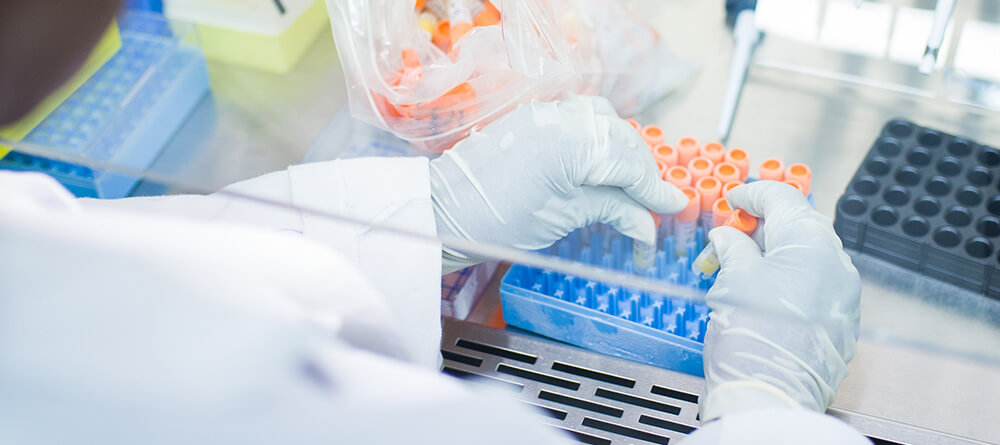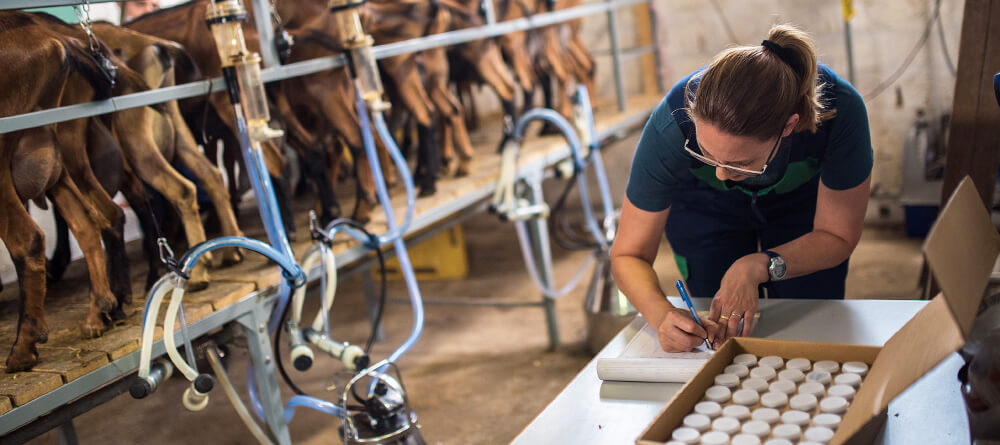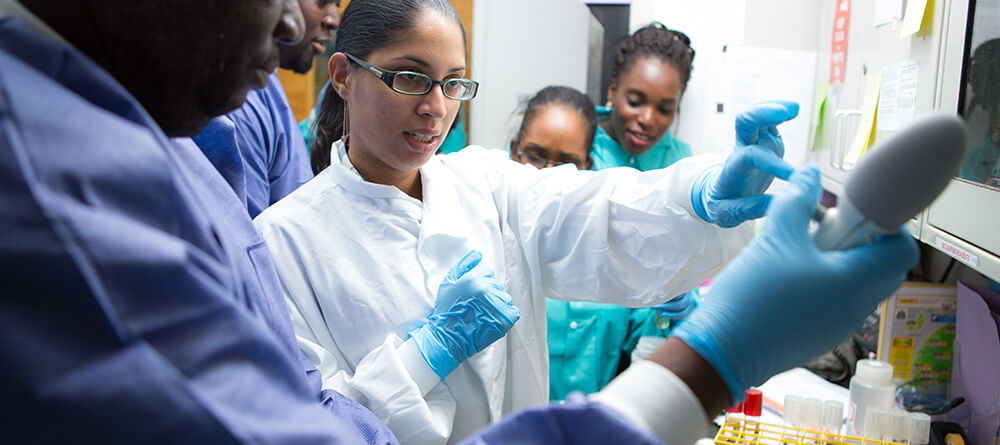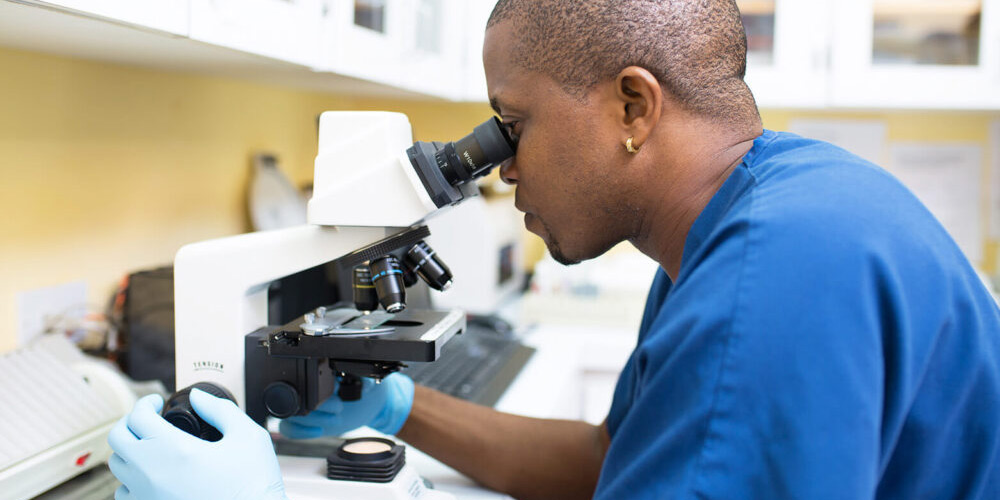As you seek out a high-quality veterinary medicine program, you’ve likely heard a lot about the criteria you should be looking for: positive graduate outcomes, impressive faculty, hands-on training, and ample student support resources, just to name a few. One element that may not have crossed your mind is to look into Doctor of Veterinary Medicine (DVM) programs that offer research opportunities. In the realm of veterinary science, research does more than lead to advancements in the care of animals. The National Academy of Sciences notes that veterinary research is critical to the protection of public health and the advancement of science that benefits both humans and animals. Read on to learn more about the benefits of veterinary research and the ways students at the St. George’s University (SGU) School of Veterinary Medicine get involved.

What is veterinary research, exactly?
Generally speaking, veterinary research includes studies on the prevention, control, diagnosis, and treatment of animal diseases. Studies may also involve the basic biology and welfare of animals. The National Academy of Sciences explains that society’s needs are constantly outgrowing our knowledge, making continual veterinary research critical. Studies of this nature can have important impacts when it comes to human–animal interfaces. To better understand these dynamics, it’s helpful to learn more about the different research areas.
3 main types of veterinary research:
- Public health and food safety: Animals, both domesticated and wild, are frequent carriers of foodborne pathogens that can cause human illness. The security of our food animals can also present a concern for human public health. Concerted research efforts help reduce the recurrence of foodborne diseases and ensure the security of our food supply.
- Animal health and welfare: The perspective of the role of animals in human society and the ecosystem has changed in recent years. In addition to maintaining the health and security of our food animals, we also know that companion and service animals play an important role in human welfare. As do lab animals, who are integral to our ability to make medical advances. Finally, the health of our wildlife is important for the maintenance of both the ecosystem and the economy.
- Comparative medicine: Our technological advances have enabled researchers to unearth the ways medical and scientific discoveries across animal species compare (including humans). Research efforts in this realm include things like comparative genetics, genome and phenome research, stem-cell research and cloning, genetically engineered animal models, and biomaterial developed to treat human and animal diseases.
Why is veterinary research important?
Because of the far-reaching impact veterinary research can have on public health as a whole, veterinary scientists bear a certain responsibility to protect human health and well-being by furthering these research efforts.
“Veterinary research is important on several levels,” offers Dr. Ray Kaplan, professor of parasitology and associate dean of graduate students at SGU. “It provides direct benefits to the health and well-being of animals, it provides indirect benefits to the health and well-being of humans, and it can provide benefits to the overall health of ecosystems.” Dr. Kaplan explains that these three elements together form what is referred to as the One Medicine approach to healthcare, which is taught to all DVM students at SGU.
Sometimes called One Health, this approach asserts that veterinary medicine is fundamental to human health. As such, veterinary scientists affect human health either directly through biomedical research and public health work or indirectly by addressing domestic animal, wildlife, or environmental health. The American Association for Laboratory Animal Science (AALAS) notes that there are a number of historical examples of animal research impacting human health.
Life-saving measures of preventative care like vaccines, insulin, and pacemakers wouldn’t have been possible without veterinary research. Veterinary scientists have also been able to discover the causes of and treatment for high blood pressure, as well as treatments for strokes and heart attacks that save thousands of lives and reduce recovery time.

Opportunities for veterinary research at SGU
“Veterinary medicine is based in science. Scientific findings occur through research,” explains Dr. Sonia Cheetham-Brow, pathobiology professor and associate dean of research at the SGU School of Veterinary Medicine. “In order to advance in veterinary medicine, exposure to evidence-based veterinary medicine and research must be a critical part of the students’ curriculum.”
“Everything we know and do in veterinary medicine is based on the research from people before us.”
Dr. Cheetham-Brow has long valued the impact of research throughout her veterinary career and encourages all DVM students to do the same. “Everything we know and do in veterinary medicine is based on the research from people before us,” she says. “[What happens] moving forward will depend on research by us.”
Dr. Kaplan highlights just how expansive veterinary science is. “The field of veterinary medicine is dynamic and ever-changing, and the amount of information is increasing too fast for anyone to keep up with everything,” he outlines. “Getting involved in research provides veterinary students an opportunity to experience firsthand the process of discovering new knowledge. This experience allows students to view and understand the profession in a new way,” Dr. Kaplan continues. “I firmly believe that learning the scientific process by participating in research builds critical-thinking skills, which are essential to practicing evidence-based medicine.”
“I firmly believe that learning the scientific process by participating in research builds critical-thinking skills, which are essential to practicing evidence-based medicine.”
The veterinary research opportunities for DVM students at SGU are numerous, from the core Veterinary Research Investigator courses that all DVM students take to more specific opportunities like the Island Veterinary Scholars Program, the Veterinary Student Research Initiative, and the Student Research Assistant Employment Program.

SGUs tropical island backdrop in Grenada also presents students with some opportunities they may not encounter at other DVM programs. “As a large university in the Caribbean, SGU is uniquely positioned to address research on topics relevant to this region, such as aquatic animal medicine and conservation, and the sustainable control of parasites in tropical environments,” Dr. Kaplan notes.
The School of Veterinary Medicine at SGU emphasizes the importance of research that is collaborative and directed toward the animal and human health issues of the region with broader geographical significance. Thus, the school’s four areas of focus with veterinary research include vector-borne diseases, aquatic animal health, parasitology and zoonoses, and public health.
Impact lives through veterinary research
“Veterinary researchers play a large and critical role in the animal-based research that provides benefits to both animal and human health. These researchers and healthcare professionals have played an important role in responding to the current pandemic, and they will continue to play an important role in helping to prevent the next one,” Dr. Kaplan concludes. Now that you know why the SGU School of Veterinary Medicine values veterinary research in its DVM curriculum, it’s helpful to explore the numerous other reasons students find success in this respected program. Learn more in our article “10 Things You May Not Know About the SGU School of Veterinary Medicine.”

